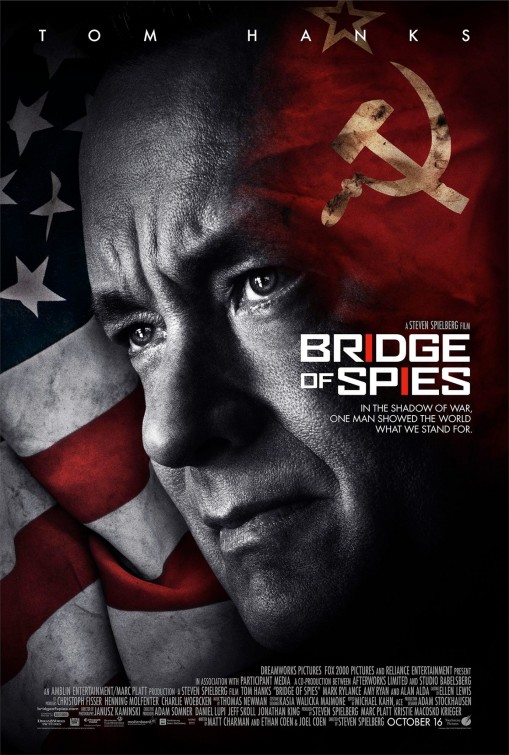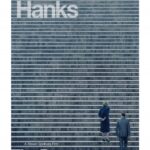In The Shadow Of War, One Man Showed The World What We Stand For
Director
Steven Spielberg
Starring
Tom Hanks
Mark Rylance
What did you think of The Terminal? Tom Hanks playing a non-English speaking national stuck in an airport? Most people tend to respond, “Yeah, it’s alright. Nothing special but it’s Spielberg and Hanks, isn’t it? It’s worth a watch.” Bridge Of Spies is essentially that but a little better.
The film opens in 1957 to a sting operation as agents in fedoras follow suspected Soviet spy, Rudolf Abel [Rylance] as he goes about his day, picks up instructions from Moscow and sets about deciphering the message. Bursting into his apartment, the CIA agents make their arrest and confiscate the contents of Abel’s hotel room. The country rallies to have the imposter strung up but in the interest of fairness, he is afforded a fair trial and affable insurance lawyer James B. Donovan [Hanks] is assigned to his defence. While he is initially reluctant, Donovan is a good man who believes in the principles of the law and accepts. As the case becomes more public, Donovan and his family are treated poorly by those around him, who see his actions as traitorous. Matters escalate as a US pilot, Francis Gary Powers [Austin Stowell] is gunned down while flying over Russian airspace and Donovan is dispatched to East Germany to negotiate for a prisoner exchange.
**Spoiler at the end of the paragraph**
After the success of Lincoln, Bridge Of Spies is a confident step forward for Spielberg but still lacks the scale and cinematic presence of his golden age work. We tend to take Mr Spielberg and his honed skill for granted but he manages to ensure that the two and a half hour running time doesn’t drag. This is also aided by the Coen Brothers‘ involvement with the script, adding a touch of much needed humour, charm and relatability. The cinematography is fantastic, the production value from the sets to the costumes, props, hair and make-up are all brilliantly immersive and the decision to avoid subtitles entirely was a very nice choice. Thomas Newman’s score has more flare than, say, his work on Mendes’ Bond films but the fit isn’t perfect and seeing Hanks’ face while hearing Newman’s signature lark-like woodwind just had me thinking of Road To Perdition and how much I love that film. Yet underneath it all there is a very distinct flaw: the concept that American life and natural decency is king. The narrative is so busy with its nostalgic recreation of Norman Rockwell visuals and flag waving proud Americanism that it glosses over the fact that a lot of people in the 50’s/60’s carried on like utter monsters under the blanket of “protecting the country from communism.” One place this is perfectly highlighted is during a train scene and its call-back at the end of the film. Having served his role as defence so expertly, Donovan is commuting on the train when he notices how he is looked upon with derision by his fellow countrymen. Spurred by headlines, the country’s bloodlust for all-things-Russian is targeted entirely at the lawyer who basically did his job and got his client a thirty year sentence down from the death penalty. The audience, empathising with the main character, feels that look of disgust and with hindsight we all sneer back and mutter, “bloody ignorant ingrates.” Then, at the close of the film, Donovan is on the same train, only this time the headline portrays the lawyer as an American to be proud of and the lady inspecting him offers the slightest of smiles. Donovan returns the smile and the music swells as if to imply “all’s well that ends well.” No! Wrong! All that says to me is that people are fickle, stupid, misinformed sheep and if anything he should have either turned away repelled by her seesawing or delivered a menacing speech about hindsight tolerance. But I’m digressing here.
The various performances are spectacularly subtle imbued with that folksy 1950’s “shucks I’m just a pilot/salesman/cop” kinda thing while displaying extreme flare for talking their way out of harm and conflict – again, something prevalent in 50’s cinema. But the further you stray from Donovan’s thread the more people become irrelevant and immaterial. Supports are wheeled on-and-off but no one arc is explored or followed very far. There’s a young assistant at Donovan’s firm who is dating Donovan’s daughter, after his introduction he’s never seen again, the life and times of the US student captured by the Stasi are glazed over completely and anything going on in East Germany fades the second it’s off-screen. In fact, there are so many interesting stories to tell but not nearly enough time to focus on any of them: the US prejudice of all things red, the division of Berlin, the power struggle between the DDR and USSR and the working lives of spies in the field, captured and disavowed by their own respective governments. There is, however, a nice parallel at play between the cold war mania and contemporary paranoia, transposing Russia for the Middle East but thanks to the level of hand-holding at work here, it’s probably lost on most audience members.
As the film winds to its conclusion it’s hard not to feel a bit deflated. The finale is a touch middling, reflectively the conflict feels somewhat inflated from nothing and there’s the uncertainty of what actually happened. This is both brilliant and awful. Cinematically speaking, it’s a little frustrating, lacking the real drama and conflict of the cold war, despite being at the heart of the development, allowing audiences to join the dots without any real layering. But it’s also a brilliant analogy for the cold war itself. A lot of blustering, fear and confusion that amounted to very little in actuality. So, depending on how you view this film, either as a treatise of American and Soviet posturing or a spy fiction narrative, you’ll either enjoy it or come away feeling somewhat disappointed.
Release Date:
27th November 2015
The Scene To Look Out For:
Midway through the film, the story of Abel’s trial is put on hold and we are whisked to a Berlin which is in the process of being annexed off. Seeing the wall go up is a strange thing to behold, it’s an event that hasn’t really been explored on a film of this scale and, most annoyingly, it still hasn’t. What we glean is a fascinating look into an oppressive regime with a government who aren’t recognised as a sovereign power. On top of that, we learn that the Soviets are still punishing Germany by refusing them the ability to rebuild the city, forcing those trapped in the East to sift through the rubble while the West enjoys the luxuries of their American occupants. It’s a great snippet but I can’t help but feel there’s a whole film’s worth of stuff that has been excised in favour of the central story.
Notable Characters:
Throughout the film there is a silent charm-off between Hanks and Rylance. Hanks, the champion of cinema, seemingly incapable of giving an unpleasing performance versus Rylance, the theatrical challenger, master of the boards and captivator of audiences. In truth, neither trumps the other but the two performances are so wonderfully complimentary that they become almost detrimental. Hanks is so delightful and Rylance is so calm that any sense of urgency is almost completely underplayed. The threat to Abel’s life is never really felt and with Donovan’s silver tongue working magic at home and abroad, there’s seemingly no obstacle that these men couldn’t best.
Highlighted Quote:
“I’m Irish, you’re German but what makes us Americans? One thing. One, one, one. The rulebook”
In A Few Words:
“There’s a bigger, more interesting film in here somewhere but what we end up with is still high-calibre, worthwhile cinema”
Total Score: 3/5
![The Red Right Hand Movie Reviews [Matthew Stogdon]](https://reviews.theredrighthand.co.uk/wp-content/uploads/2021/12/cropped-header1.png)




